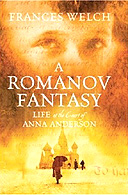
A Romanov Fantasy
by Frances Welch
304pp, Short Books, £14.99
In 1994 the game was finally up. DNA testing proved, once and for all, that Anna Anderson, the toothless, peasanty grouch who had spent more than 60 years pretending to be the Grand Duchess Anastasia, was a fraud. She was, in fact, exactly what she had always appeared to be: a dumpy factory worker called Franziska Schanzkowska who, in the confused aftermath of the Bolshevik revolution, had managed to convince a gaggle of dispossessed Russian aristocrats that she was the last living link to the murdered Romanovs. For the best part of the 20th century a few moth-eaten royalists and camp followers in Paris and New York had clung to the hope that, out of the grim slaughter of July 17 1918, one girl had been spirited away and was now living quietly in a series of shabby hotel rooms, biding her time until Russia once more required a princess.
Until the final revelation of the DNA, which came 10 years after Anderson's death in 1984, it was almost possible to believe that she had, indeed, been Anastasia. There were plenty of childhood friends of the grand duchess who were ready to swear that Anderson's funny little laugh, her piercing eyes and the scar at the base of her middle finger belonged to the child whom they remembered from all those years ago. More convincing than any of these physical tics was Anderson's manner. Giving every impression of not caring whether anyone believed that she was the tsar's youngest daughter, she exuded the kind of wilful nonchalance which her supporters were quick to identify as the unfakeable hallmark of "a born lady".
Yet for every crown princess who believed in Anna Anderson, there was a royal duke ready to scoff. She was too short, too clumpy, her voice was all wrong. She didn't understand Russian, she failed to recognise key players from her childhood, and she changed her story all the time about what happened on that terrible July night in "the House of Special Purpose". What's more, suggests Frances Welch in this thrillingly readable book, there were added reasons why Anastasia's relatives might be keen to keep her dead and buried. There was rumoured to be a tidy fortune in the Bank of England which had been squirrelled away by the tsar. With all his direct descendants gone, the money could now be claimed by his surviving sisters. But if Anastasia were still alive it would go directly to her. No wonder that Grand Duchesses Olga and Xenia were reluctant to acknowledge the wretched little pretender as belonging to their bloodline.
Anderson was not the only person who claimed to be a miraculously surviving member of the Russian royal family. In the inter-war period there was a whole gaggle of Anastasias, not to mention Tatianas, Olgas and Marias, sprawled across Europe. Some of them were prostitutes seeking to add a touch of class to their services, others were just plain mad. There was even one Alexis who claimed that his childhood haemophilia had been happily magicked away, and another who, in adult life, was said to enjoy ballroom dancing.
What interests Welch are not the "is she, isn't she" aspects of the Anastasia case (which was solved thanks to a bit of intestine Anna left behind in a Virginian hospital during a routine operation and a blood sample provided by the Duke of Edinburgh), but the fantasies generated by Anderson's situation. (To call it a hoax would be far too strong - the befuddled woman seems simply to have ridden the waves of desire generated by well-meaning strangers who desperately wanted to see a fairy tale come true.)
In particular, Welch provides some wonderful pen sketches of dispossessed Russian courtiers, now condemned to eke out a living as best they can. There is Maria Rasputin, the shaman's daughter, who worked in a German circus as an acrobat (she claimed to be a lion tamer in order to sound more interesting and later endorsed a story that her father's penis, grandly lodged in a velvet box, was being watched over by fanatical émigrés in Paris). Initially Maria believed Anderson's claim to be the grand duchess, but then changed her mind. This volatility was put down by another of Anderson's supporters, Gleb Botkin, to the fact that Maria was from Siberia and had piggy eyes. Botkin, by contrast, was the son of the Romanovs' personal physician, who had died with them in the House of Special Purpose. Having fled to America, Botkin junior set up his own Church of Aphrodite, a cheery faith which basically allowed you to do whatever you wanted, as long as you remembered to smile. It is perhaps lucky that Botkin, whose sacramental Aphrodisian robes looked suspiciously like converted curtains, died before Anderson and so never had to confront the fact that he had spent his adult life in the service of a chimera.
One question that Welch never confronts - because the evidence isn't there - is what on earth made Franziska Schanzkowska claim, and go on claiming, to be the Grand Duchess Anastasia. The scant material on her early life suggests a restless girl who longed to escape the factory in order to become an actress. But any desire to play the princess seems to have faded early on. She had little interest in material wealth, seldom cashed the cheques provided by supporters, and was never more pleased than when given a bit of Yardley soap and an orange. Was she trapped in a silly lie that she had allowed to be circulated about herself in 1921 when she was languishing in a Berlin hospital? Or had she come to believe she was a Russian princess? Anderson went to her grave without explaining, and Welch is too fastidious a scholar to speculate on her behalf.
· Kathryn Hughes's biography of Mrs Beeton is published by Harper Perennial

